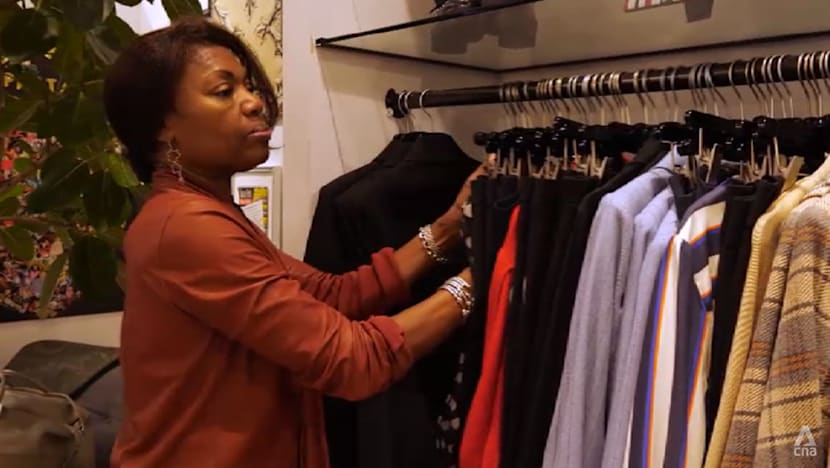US small businesses feel tariff squeeze as costs rise
As import duties rise and inflation climbs, American entrepreneurs say the uncertainty is making it hard to plan ahead.

New York boutique owner Deborah Koenigsberger said the unpredictability of President Donald Trump’s tariffs makes it difficult for small businesses like hers to plan ahead.

This audio is generated by an AI tool.
NEW YORK: For 35 years, Deborah Koenigsberger has grown her Manhattan boutique, Noir et Blanc, on high-quality, handpicked clothing, much of it sourced from France.
But this year, her usual trip to Paris Fashion Week is off.
“I can’t go to Paris and order a season’s worth of merchandise and then not be able to bring it in, because the tariffs have taken me to a point where I can’t sell it,” she said.
Koenigsberger said the unpredictability of United States President Donald Trump’s tariffs makes it difficult for small businesses to plan ahead. She described the levies as “punitive”.
Under a trade framework announced in July, the US and the European Union (EU) agreed to impose a flat 15 per cent tariff on most European imports. The move followed earlier threats from Washington to levy tariffs as high as 30 per cent on EU goods.
Koenigsberger’s current collection has avoided the duties because she buys a year in advance. But next season’s purchases could be a different story. This has forced her to rethink how she runs her business and who she employs.
“If this comes to pass, I’m going to have to really sit down and remap and pivot in a way that makes sense,” she said. “Hopefully I can keep my staff, but it’s going to depend on what my bills do.”
HIRING SLOWDOWN
The challenges Koenigsberger faces are not unique. Data shows that US businesses are now less inclined to hire workers.
American employers added just 22,000 jobs in August, lower than expected.
Average job growth between May and August fell by 75 per cent compared to the same period in 2024. Data for September and October have been delayed due to the government shutdown.
Inflation, meanwhile, has edged above 3 per cent.
Jessica Walker, CEO of the Manhattan Chamber of Commerce, said many businesses are adopting a “wait-and-see” approach to hiring or layoffs.
“It’s not where we want to be,” Walker said. “We were seeing robust job growth before the tariff policy came into our lives. And we want to get back to that.”
RISING COSTS ALL ROUND
Just down the street from Noir et Blanc, Patrick Hall, co-owner of Elan Flowers, is also feeling the strain. His shop imports blooms from cultivated flower farms wherever the growing season is best for different varieties.
While tariffs have added to the costs, Hall said they are just one of many factors weighing on his business, such as healthcare and retirement plans for his staff.
“It's really hard to maintain your profit, and to make a profit, when you've got rising costs on real estate and tariffs. And, healthcare costs us more as a small business than it does large businesses,” he said.
“Same thing with sponsoring a 401K (retirement savings) plan. It costs us small businesses more than it does the large corporations because of economies of scale.”

‘LAWMAKERS SHOULD PAY ATTENTION’
Hall believes lawmakers, who often tout small businesses as the lifeblood of “Main Street”, need to better understand the issues they face.
He has even suggested a “bring your legislator to work” day to show them how challenging it can be to run a boutique firm.
“Sit beside me when I’m trying to make payroll,” Hall said. “Spend one day with me so that you can better understand what the differences are that small businesses face.”
He noted that the steep import duties imposed since Trump’s return to the White House this year have only added insult to injury.
Hall added it is upsetting that he has to weigh their impact on top of existing costs, while Koenigsberger described tariffs as a “dirty word”.
But by whatever name they are called, industry players say the Trump administration's move to limit goods from outside the country is already hitting Americans where it hurts.















